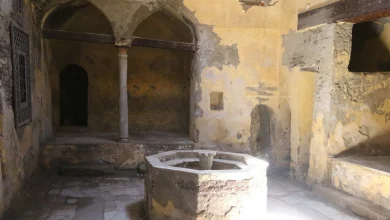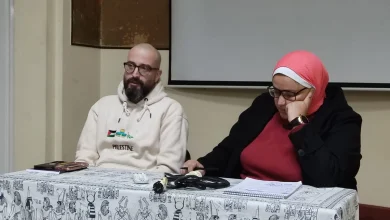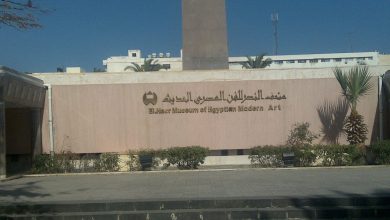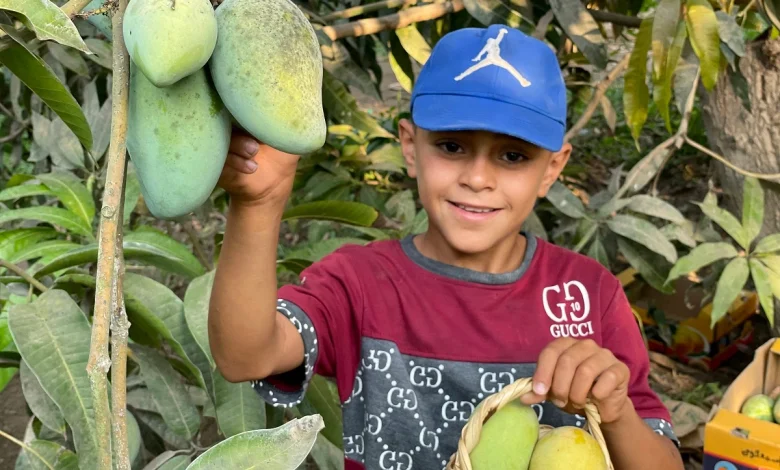
“Mango tourism” in Ismailia: summer fun with a taste of heritage
There are no beaches here, no air-conditioned museums, no temples, and no historical monuments. Just trees to shelter us from the summer heat and a rural atmosphere that opens the door to family outings with different rituals, starting with picking your favorite fruit from the source. Some may even be tempted to taste the fruit before washing it, out of their eagerness to pick the first fruit at the mango tourism festivals.
The city of Ismailia experiences a tourist boom during the summer. Visitors can enjoy a delicious fish meal from Lake Timsah and buy the city’s famous mangoes. Now, they can spend a day at a mango farm and pick the fruit themselves. This new outing has become part of the growing eco-tourism scene in Ismailia.
This is where mango tourism began
With the launch of the first Mango Festival in 2022, a private farm opened its doors to visitors to enjoy the experience of picking fruit and spending a simple day in the countryside among mango trees and rural food. The popularity of the farm attracted other farmers to open their trees to visitors from outside Ismailia as part of mango tourism.
Mohamed Sabah, a farm owner in Ismailia, said, “We run a family farm, but it is now open to visitors during the mango and strawberry seasons.
It’s a new opportunity to increase tourism in the city. It’s also a new attraction for visitors to Ismailia, who can enjoy the experience of picking mangoes, Egypt’s most famous fruit.” Sabah explains that he gives visitors instructions on how to pick mangoes using a primitive hook attached to a long stick to reach the fruit on tall trees.
He warns them not to pick mangoes that are still green, to distinguish the ripe ones, and not to play or jump on the trees so as not to damage the fruit.
The city of Ismailia has become a destination for rural tourism. Among the Egyptian villages listed by the United Nations as the best destinations for tourism are West Sohail in Aswan, Abu Ghassoun on the Red Sea, and Dahshur in Giza. Other areas that welcome rural tourism include Fayoum, Burullus, and the Siwa Oasis in Matrouh.
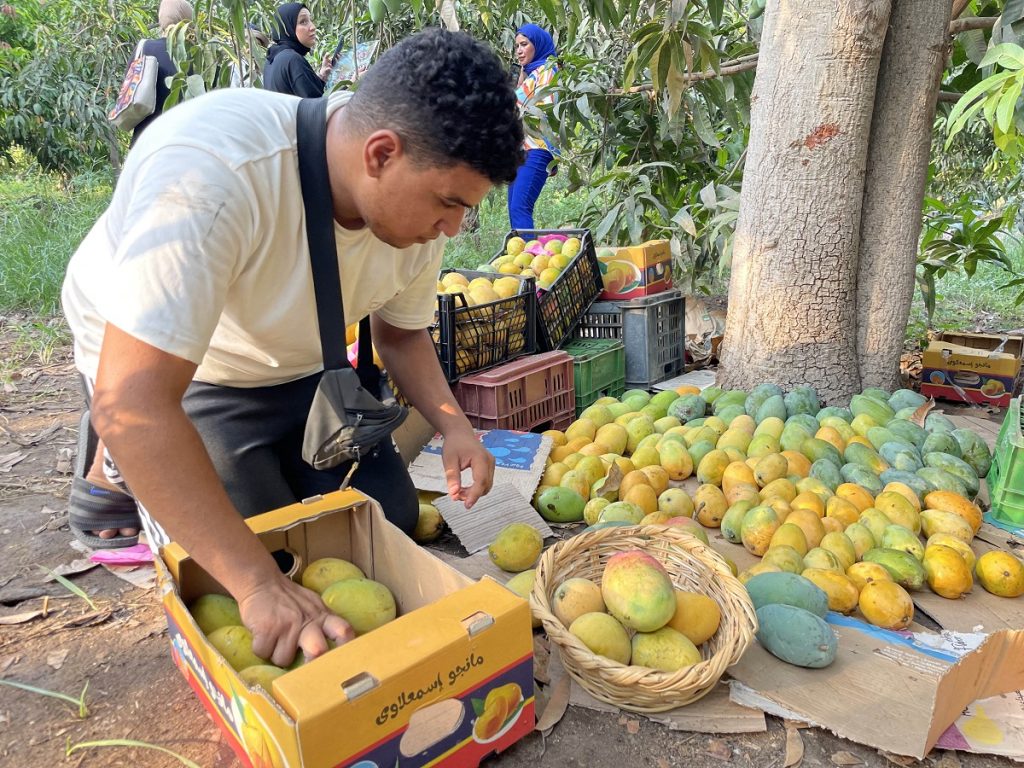
Minor losses in the face of enjoyment
Sabah adds, “Despite the instructions, sometimes there are losses in the crop due to mangoes being picked by mistake. The loss can be between 10 and 20% of the tree, but I am used to this percentage even in normal times, without visits. Nothing is 100% without losses.”
He continued, “This type of tourism has certainly opened the door to additional income for the farm, in addition to selling the harvest, but it is mainly moral support. It is enough for me that visitors thank us for the taste of organic mangoes that they pick themselves and feel their different taste. For me, this is more important than any financial gain.”
With the increasing number of mango tourism visits to Ismailia, the city is preparing to launch the third edition of the Mango Festival on August 8, as a way to capitalize on the popularity of the province’s most famous fruit.
Diplomatic promotion of mangoes
In September 2020, a post by the New Zealand ambassador to Cairo, Greg Lewis, went viral, in which he expressed his passion for mangoes, especially the “Al-Aweis” variety. He described them as “an extraordinary ambassador for Egypt.”
The ambassador then began exchanging mangoes with the ambassadors of Australia and Canada as gifts. The owner of a private farm picked up on this initiative and began preparing his farm to receive diplomatic visits and video bloggers to promote mango tourism before the official festival kicks off in 2022.
Bladieh Salah El-Din, a tour coordinator in Alexandria, says she now includes a visit to a mango farm in her tours to Ismailia, alongside museums and a tour of Lake Timsah. This is because participating in the mango harvest is an experience that is unlike the daily work routine.
She adds, “Visiting the farm in the middle of the mango groves and eating country food has become increasingly popular as a way to get in touch with nature. Mangoes are a beloved fruit, and seeing them on the trees is a unique experience, because we don’t usually see the stages of harvesting and transport from the field to the market.”
She emphasizes, “The city of Ismailia is famous for mangoes, so it’s fun to pick them in the best place. It’s a wonderful experience because mangoes are a unique fruit that we don’t see in many crops like vegetables. They grow in large farms and tall trees, and they are also difficult to harvest.”
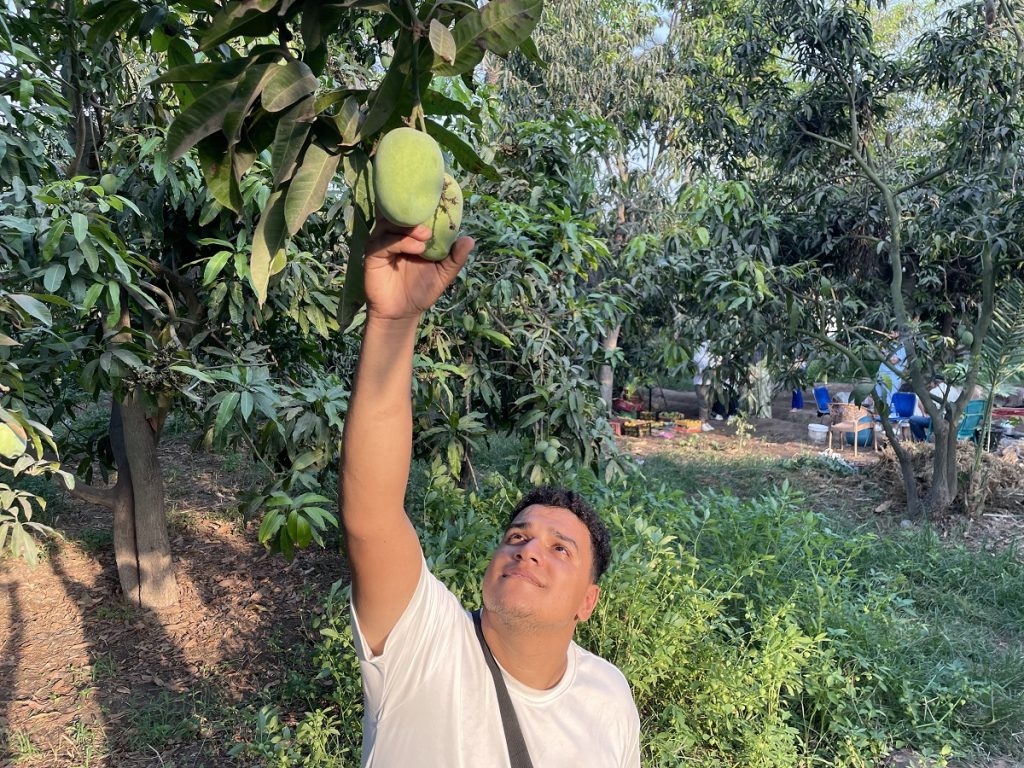
Nature heals
Samar Abed, a fitness trainer, agrees with him during her visit to a mango farm on a family outing, where she let her son play among the trees and experience a day in the countryside. She says:
“I like to include visits to natural places in my family outings, and the mango farms in Ismailia have become the perfect destination. In the countryside, you feel cleansed from within, surrounded by crops and mangoes.”
Samar, who calls herself “Captain Mora” and specializes in fitness training, adds: “Nature is good for improving your mental state and keeping depression at bay. In my work as a fitness trainer, I prefer working in open spaces, whether in nature or out in the countryside or by the sea. The atmosphere there is pleasant and makes a difference to the children, re-energizing them during the vacation and preparing them for the new school year.”
Multifaceted tourism
Ashraf Soliman, director of tourism at the Ismailia Governorate General Office, says: “Ismailia is known for day trips, which account for about 70% of the governorate’s tourism income. In recent years, the governorate has begun to shift toward multi-activity tourism.”
He adds: “The first signs of this have begun to appear through sports festivals and an increase in archaeological sites. There is also festival tourism, especially festivals specializing in agricultural products such as strawberries since the 1980s. Currently, we are preparing for the third edition of the mango festival.”
He continues: “In conjunction with the mango festival, a type of eco-tourism or rural tourism has spread. Tourists spend a day on mango farms, cooking their own food. They fish from the lake themselves and experience fruit picking.” He says: “This type of mango tourism has attracted a new type of visitor to the city, especially foreign tourists, who prefer to spend a day enjoying a purely rural experience and organic rural products.”
Expanding mango tourism
Ashraf Suleiman points to the role of a farm run by Ahmed Shuja, a member of the mango festival organizing committee, in opening his farm to outside visitors. Other farmers, such as Dandash and Abu Sabah, followed suit. He adds:
“We are currently working with the Directorate of Agriculture to raise awareness among farmers about the possibility of preparing their farms to receive visitors. This has economic benefits, as it is a new type of mango tourism.”
He says: “Mango tourism has launched a revitalization movement for tourism in Ismailia. This is where the tourism administration comes in to follow up on the activities of the farms and prepare visit programs that include tourist areas such as museums, or free tours of the French quarter, or visits to the beaches of Lake Timsah and the Suez Canal.”
He adds, “We aim to make Ismailia a multifaceted tourist destination, whether through monthly sporting and cultural events, such as the Folk Arts Festival, the Documentary Film Festival, and Simsimiyya, or through the promotion of agricultural products linked to the city’s history, such as the Strawberry and Mango Festivals.

